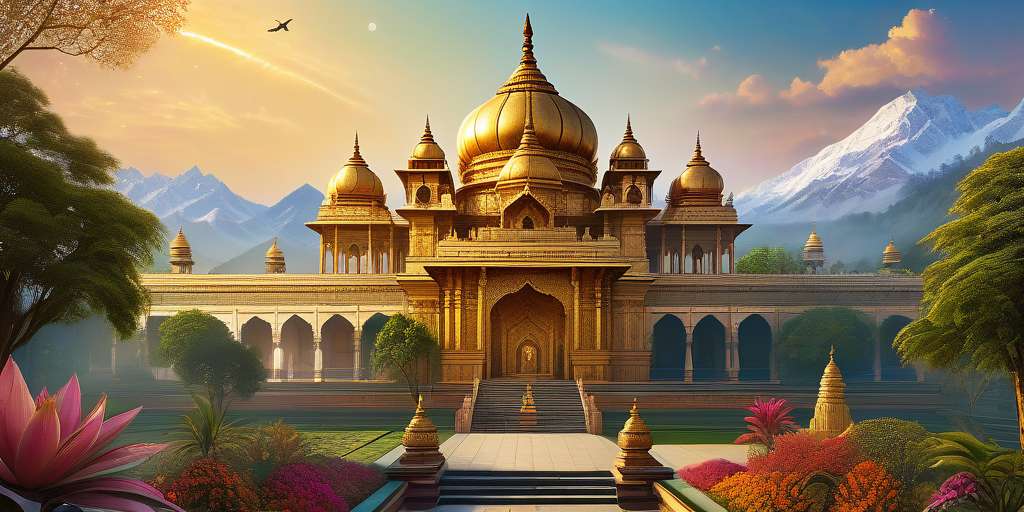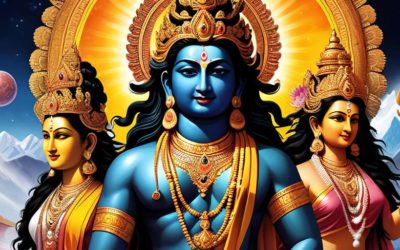Hindu Mythology

Hindu mythology is a vast and diverse set of beliefs and legends that form an integral part of Indian culture and religion.
In it, the deities Brahma, Vishnu and Shiva occupy central roles, representing respectively the creation, preservation and destruction of the universe.
These gods are revered throughout India and are present in numerous myths and epics, such as the Ramayana and the Mahabharata.
In addition, Hindu mythology encompasses other mythological concepts and beings, as well as ethical teachings and cultural values.
This mythology has been a fundamental pillar of Hindu religion and culture, conveying teachings about morality, ethics and divine purpose in the world.
Mythological stories provide a cosmogonic view of the universe and shape Hindu practices and traditions.
These symbolic and parabolic stories have a profound impact on the daily lives of followers of Hinduism, as they are considered a guide to living a virtuous life in harmony with the cosmic order.
Deities of Hindu mythology
Hindu mythology is full of gods and goddesses who play fundamental roles in Hindu cosmology and religion.
These deities are worshipped and revered throughout the Indian subcontinent.
Below, we will explore three of their most important deities: Brahma, Vishnu and Shiva.
Brahma: The creator of the universe
Brahma is considered the creator god of the universe in Hindu mythology.
Although he is often depicted with four heads, Brahma is a deity little worshipped in comparison to other major deities.
According to Hindu belief, Brahma created the world and all living beings.
He is credited with the authorship of the Vedas, the oldest sacred texts of Hinduism.
Although Brahma is the creator, his role also includes the maintenance and destruction of the universe, which links him to the other aspects of the divine triad.
Vishnu: The Preserver and Protector
Vishnu is one of the most revered and beloved gods in Hindu mythology.
He is considered the preserver and protector of the universe.
Vishnu is known for his numerous incarnations or avatars, the most prominent being Rama and Krishna.
According to belief, Vishnu descends to Earth in times of crisis to restore balance and eliminate evil.
His role is to maintain cosmic order and protect humanity.
Shiva: The destroyer and transformer
Shiva, often depicted in the form of a man with three eyes and messy hair, is the destroyer and transformer god in Hindu mythology.
Although destruction may seem negative, Shiva symbolizes the change necessary for rebirth and regeneration.
He is associated with meditation, penance and the destruction of the human ego.
Shiva is also known as the creator of yoga and is depicted with the drum of time, which marks the beginning and end of cosmic cycles.
Myths and legends of Hindu Mythology
Hindu mythology is replete with fascinating myths and legends that stir the imagination and convey valuable teachings.
These transcendent stories transport us to an ancient world filled with gods and goddesses, heroes and heroines, and extraordinary events.
Below, we will explore some highlights of the myths and legends of Hindu mythology.
The birth of gods and goddesses
A recurring theme in Hindu mythology is the divine origin of the gods and goddesses.
In these stories, we unveil how these supreme deities came into being and how their interventions have shaped the world we live in.
We discover how Brahma, the creator, emerged from a lotus that sprouted from Vishnu’s navel, and how Vishnu, the preserver, has incarnated in various forms to maintain balance and harmony in the universe.
It also tells the story of Shiva, the destroyer and transformer, whose cosmic dance brings about the end and rebirth.
Hindu Epics: Ramayana and Mahabharata
Two of the most celebrated epics of Hindu mythology are the Ramayana and the Mahabharata. Both narratives recount the exploits and adventures of heroes and heroines, and are replete with human passions, moral dilemmas and epic confrontations.
The Ramayana recounts the odyssey of Prince Rama to rescue his beloved wife Sita, while the Mahabharata focuses on the war between the Pandavas and the Kauravas, two rival families fighting for the kingdom of Hastinapura.
The teachings of the Bhagavad Gita
One of the most sacred and philosophically rich works of Hindu mythology is the Bhagavad Gita.
Set at the heart of the Mahabharata, it is a dialogue between Prince Arjuna and the god Krishna, who serves as his guide and counselor.
In this text, fundamental themes such as duty, morality and the purpose of life are explored.
The Bhagavad Gita presents a path of selfless action and devotion to divine service, providing valuable lessons for facing challenges and decisions in our own existence.
Mythological concepts and symbolism in Hindu mythology.
Hindu mythology is replete with mythological concepts and symbolisms that enrich and give depth to its stories.
These elements are fundamental to understanding the worldview and beliefs of the Hindu religion.
Below, we will explore some of the main mythological concepts present in Hindu mythology:
Devas and Asuras: The struggle between divine and demonic forces
In Hindu mythology, the Devas are considered divinities, celestial and luminous beings, representing good and wisdom.
On the other hand, the Asuras are demons and dark beings that personify the forces of evil and chaos.
Both forces are in constant conflict and face each other in epic battles in mythological stories.
This symbolism of the struggle between good and evil reflects the eternal inner struggle that every individual faces in his or her life.
Mythological Beings: Nagas, Kinnaras and Vetalas
Hindu mythology is populated by a wide variety of mythological beings, each with its own history and characteristics.
Nagas are divine serpents, considered guardians of wisdom and wealth.
The Kinnaras are half-human and half-bird beings, known for their beauty and musical talent.
The Vetalas, on the other hand, are restless and mischievous spirits that inhabit forests and cemeteries.
These mythological beings represent different aspects of human nature and have a symbolic role in mythological stories.
Mythological Weapons and Vehicles: Astras and Vimanas
Hindu mythology is also full of mythological weapons and vehicles that play an important role in battles and key moments in stories.
Astras are mythical weapons that possess supernatural powers and are used by gods and heroes.
Each Astra has its own abilities and devastating effects on the battlefield.
On the other hand, Vimanas are mythical airships mentioned in Hindu epics and are believed to have the ability to fly through the skies.
These mythological elements represent the power and prowess of divine personages.
Hindu mythology in Hindu religion and ethics
Hindu mythology plays a fundamental role in Hindu religion and ethics, influencing various practices and traditions.
Through its myths and legends, Hindu cosmogony offers a profound vision of the world and human existence.
Hindu cosmogony and world view
According to Hindu mythology, the universe was born from Hiranyagarbha, a golden womb that emerged in the primordial darkness.
This cosmogonic concept establishes the importance of the existence of Swarga and Prithvi, central deities in the Hindu religion, representing divine and earthly dimensions.
The worldview in Hindu mythology is linked to the cycle of creation, preservation and destruction of the universe, personified in major deities such as Brahma, Vishnu and Shiva.
These cosmic forces influence the understanding of life and death, and are considered spiritual and moral guides.
Influence of Hindu mythology on Hindu practice and traditions.
Hindu mythology plays a fundamental role in the religious practice and cultural traditions of India.
Myths and sacred stories are transmitted through rituals, festivals and ceremonies, which strengthen the connection between devotees and divinities.
The ethical and moral values present in Hindu mythology also have a significant impact on the daily lives of followers of Hinduism.
These mythological stories promote principles such as truth, justice and compassion, urging believers to live in accordance with these sacred teachings.
Hindu mythology as a source of ethics and cultural values
Hindu mythology provides not only a religious basis, but also an ethical and moral guide for Hindu society.
These mythological stories promote the importance of living in a conscious and respectful manner towards other living beings and nature.
In addition, Hindu mythology serves as a source of inspiration for artistic and cultural expressions in India.
Dance, music, literature and visual representations find in Hindu myths a rich source of motifs and symbolism.
- Hindu mythology is a compendium of stories and concepts that enrich religious and cultural practice in India.
- Their cosmogonic and moral vision influences the understanding of the world and personal and social ethics.
- Hindu rituals and festivals are steeped in mythological myths and legends, strengthening the connection with divinities.
- The ethical and moral values transmitted by Hindu mythology are fundamental in the daily life of the followers of Hinduism.
- Hindu mythology also influences Indian artistic and cultural expressions, providing inspiration and symbolism.
Fascination with Hindu mythology
Hindu mythology is a fascinating corpus of stories and beliefs that has played a pivotal role in the religious and cultural life of India.
Throughout this article, we have explored the major deities of Hindu mythology, such as Brahma, Vishnu and Shiva, and discovered their importance as creators, preservers and transformers of the universe.
We have also delved into the myths and legends that make up the rich Hindu tradition, from the birth and epics of the gods and goddesses to the spiritual teachings of the Bhagavad Gita.
These stories offer us a deep insight into Hindu cosmogony and ethics, as well as an understanding of the cultural values that have shaped Indian society over the centuries.
Hindu mythology is full of symbolic concepts and symbolism, from the eternal battle between divine deities and demons to the presence of mythological beings such as Nagas, Kinnaras and Vetalas.
Also, we cannot fail to mention the powerful mythological weapons and vehicles, known as Astras and Vimanas, which add a mystical touch to these narratives.
In relation to Hindu religion and ethics, the impact that Hindu mythology has had on the practice and traditions of this religious community is undoubted.
Hindu cosmogony provides both a spiritual and physical worldview, and the mythological stories convey ethical teachings and cultural values that guide the daily lives of Hindus.
Trimurti: The sacred trinity of Hindu mythology
Trimurti is the supreme trinity of Hindu mythology, consisting of Brahma, Vishnu and Shiva. These gods represent the creation, preservation and destruction of the universe. Shiva, known as the destroyer and reborn god, occupies a fundamental role in Hinduism. On the...
Subscribe
If you want to receive in your mailbox stories, curiosities and legends of the most fascinating creatures of classical mythology just fill in this form.

Classical Mythology
mitologiaclasica.com is a website dedicated to explore and spread the fascinating richness of mythology, offering a vast compendium of stories, characters and legends.
Madrid, 2023
info@mitologiaclasica.com
Explore
Greek Mythology
Roman Mythology
Norse Mythology
Egyptian Mythology
Hindu Mythology
Chinese Mythology
Japanese Mythology
Celtic Mythology
Privacy Policy
Privacy Policy
Copyright mitologiaclasica.com
